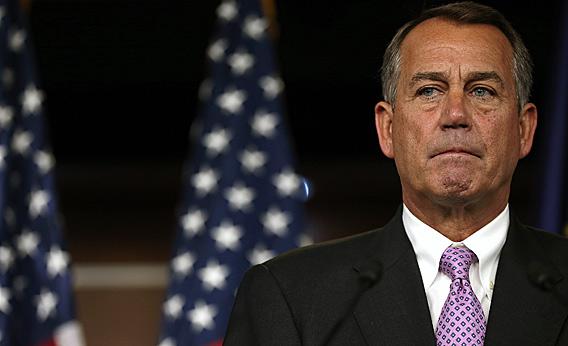Remember the famous scene from Raiders of the Lost Ark when Indiana Jones faces off against a guy who unsheathes a scimitar and wows the audience with his fancy swordsmanship–only to get shot in the chest by Indy? The swordsman—that’s House Speaker John Boehner right now on the Bush tax cuts. Whether it’s out of deference to the office, eagerness to have an interesting story to write about, or plain gullibility, every congressional reporter in town is now dutifully reporting on his negotiating strategy. But this fight is over. Boehner has brought a knife to a gunfight, only nobody seems to have told anyone in the conservative movement.
To recap, the basic situation is this. Back when George W. Bush was in office, he wanted to cut taxes. And he wanted to disguise the cost of his tax cuts. So he had his allies on Capitol Hill write the legislation so that the tax cuts would automatically expire at the end of a 10-year window.
That window closed at the end of 2010. But during the 2010 lame-duck session, Republicans were riding high on electoral victory and the Obama administration was concerned that tax hikes would hurt the economy. So they cut a deal to extend the Bush tax cuts two more years into the 2012 lame-duck session. It was a smart idea for everyone concerned. With the economy weak, there really was no case for a short-term tax increase, and this way the presidential election would resolve everything. If Obama lost, his GOP opponent would surely sign a permanent extension of the Bush tax cuts. But if Obama won, then he’d block any extension.
As you probably heard Tuesday night, Obama won.
Obama’s party also gained two Senate seats and a handful of seats in the United States House of Representatives. Consequently, the Bush tax cuts are toast. This is a question of fact, not of interpretation. The American political system is full of checks and balances, and the way the game works is that tie goes to the status quo. And in this case, the status quo is that the tax cuts expire. Conservatives can perhaps console themselves with the realization that the expiration isn’t an underhanded liberal trick. It’s their own trick, undertaken to make the apparent cost of the tax cuts smaller. Next time, having learned their lesson, they should just pass a smaller, but more permanent, reduction in taxes. If they’d done that, then Obama would have no power to force higher rates on the country. He could beg and plead for a grand bargain day and night and it still wouldn’t happen. The cold hard reality is he doesn’t have the votes in the House to raise taxes and he can’t get the votes because the House is locked down for the GOP thanks to well-drawn district boundaries.
But Republicans didn’t create permanent cuts when they had the chance in 2002. Their daring strategy raised the stakes, but they didn’t get the cards they need. Game over.
Yet the conservative movement, Boehner, the media, and—most amazingly of all, many leaders in the Democratic Party—are still playing. Boehner delivered a post-election speech calling for tax reform that would put the top marginal income tax rate even lower than it is today. Sen. Chuck Schumer says Democrats will work with the business community to persuade Boehner to change his mind.
The conceit here is the frankly bizarre idea that since Obama wants to extend the Bush tax cuts for the middle class, he needs to engage in some kind of bargaining process. But this is silly. The Senate already passed a plan to extend the middle-class tax cuts. Now the choice before the House of Representatives is whether they want to vote to pass that plan before the new year or after the new year. Grover Norquist, the conservative Solon on taxes, appears to have made a metaphysical ruling that a vote for partial extension (before the new year) is a vote for higher taxes. That’s silly, but the dictates of holy writ are often a bit arbitrary. All Republicans need to do is wait until the Bush tax cuts have already expired. At that point, a vote for a tax cut that Obama will sign—i.e., the middle-class tax cuts only—would clearly be a vote to cut taxes rather than raise them.
To take the bargaining process seriously at this point you have to believe that come 2013, House Republicans would actually refuse to cut taxes on the grounds that the president’s tax-cut proposal doesn’t cut taxes enough. Then they would blame the economic drag and middle-class pain that their own refusal to cut taxes had caused on the Democrats. But that doesn’t pass the laugh test as a political argument. It ignores the fact that the GOP quite genuinely wants to see rich people pay lower taxes. And since rich people have lots of income that falls below the top bracket cutoff, they actually benefit massively from the middle-class tax cuts Obama favors.
There’s no political or substantive reason for Republicans to resist a post-new-year tax cut proposal. That means there’s no leverage on the GOP side and nothing for the parties to negotiate over. Republicans took a risk with the tax sunsets, and they lost. Boehner is bluffing, and it’s time for everyone to recognize that, take the next couple of months off, and pass the Obama middle-class tax cuts in January.
